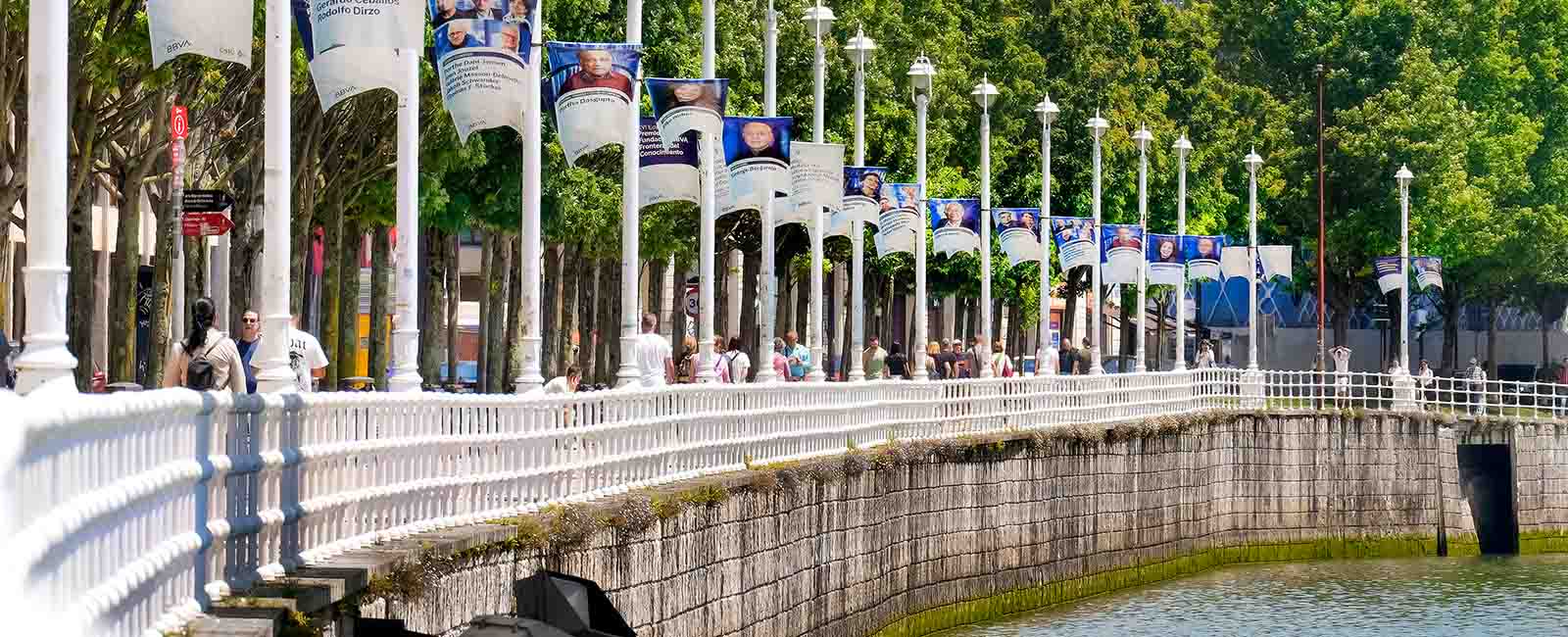
The ceremony of the 16th edition of the Frontiers of Knowledge Awards will be held on June 20 in Bilbao
On Thursday, June 20, Euskalduna Bilbao will be the venue for the presentation ceremony of the 16th Frontiers of Knowledge Awards. The evening before, the gala concert in honor of this year’s recipients of the BBVA Foundation’s international prizes, recognizing scientific and cultural excellence, will be held at the same venue. In 2019, the BBVA Foundation decided to make Bilbao the permanent home of the ceremony, and this will be the fifth time it has been hosted by the Bizkaia capital. The event will be streamed live on the BBVA Foundation homepage at 19:30 (Spanish standard time).
6 June, 2024
The Frontiers of Knowledge Awards, established in 2008, recognize and reward contributions of singular impact in science, art and the humanities, privileging those that significantly expand the frontiers of the known world, open up new fields, or emerge from the interaction of various disciplinary areas.
In their 16th edition, mathematicians Claire Voisin and Yakov Eliashberg have won the award in Basic Sciences for work that has driven forward mathematical thought by building bridges between two key areas of geometry.
The award in the Biology and Biomedicine category has been granted to Ulrich Hartl, Arthur Horwich, Kazutoshi Mori and Peter Walter for discovering the biological mechanisms behind protein function and their role in the origin of multiple diseases.
Takeo Kanade has won the award in Information and Communication Technologies for developing the mathematical foundations for computer vision and robot perception.
In the Ecology and Conservation Biology category, the award has gone to Gerardo Ceballos and Rodolfo Dirzo for quantifying the scale of the sixth mass extinction of species.
Dorthe Dahl-Jensen, Jean Jouzel, Valérie Masson-Delmotte, Jakob Schwander and Thomas Stocker share the award in Climate Change for discovering the link between greenhouse gases and rising global temperatures enclosed within the polar ice.
The award in Economics, Finance and Management has gone to Partha Dasgupta for defining the field of environmental economics by incorporating and quantifying the social value of nature.
The award in Humanities and Social Sciences – a category alternating annually between the two domains, with this edition devoted to the Social Sciences – has gone to Elke Weber for her research on environmental decision-making and the factors that motivate action against climate change.
Finally, in Music and Opera this year’s winner is composer George Benjamin for modernizing the operatic language while maintaining a rigorous and fine-grained workmanship in all aspects of composition.
About the BBVA Foundation Frontiers of Knowledge Awards
The goal of the BBVA Foundation Frontiers of Knowledge Awards is to celebrate and promote the value of knowledge as a public good without frontiers, the best instrument at our command to take on the great challenges and opportunities of our time. Their eight categories are congruent with the knowledge map of the 21st century, ranging from basic science to environmental and climate studies by way of biomedicine, economics, information technologies, social sciences, the humanities and the universal art of music.
The committees deciding the awards are formed by internationally reputed experts, who deliberate independently applying the indicators and metrics of excellence proper to the subject area. Nominations are received each year from many of the world’s most prestigious academic, research and artistic institutions.
The BBVA Foundation is aided in candidate evaluation in the eight award categories by the Spanish National Research Council (CSIC), the country’s premier public research organization. CSIC appoints evaluation support panels made up of leading experts in the corresponding disciplinary domain, who are charged with undertaking an initial assessment of candidates, and drawing up a reasoned shortlist for the consideration of the award committees. CSIC is also responsible for designating each committee’s chair and participates with the BBVA Foundation in the selection of its members, ensuring the objectivity and merit of the selection process.
26 Frontiers laureates have later won the Nobel Prize
An external indicator of the excellence of the Frontiers of Knowledge Awards is that 26 laureates have gone on to receive the Nobel Prize.
Eleven Frontiers awardees have gone on to win the Nobel Prize in Economics: Lars Peter Hansen (2013), Jean Tirole (2014), Angus Deaton (2015), William Nordhaus (2018), Abhijit Banerjee and Esther Duflo (2019), Paul Milgrom and Robert Wilson (2020), David Card (2021), Ben Bernanke (2022) and Claudia Goldin (2023).
The Nobel Prize in Medicine has recognized the contributions of six Frontiers awardees: Shinya Yamanaka (2011), James P. Allison (2018), David Julius and Ardem Patapoutian (2021) and Katalin Karikó and Drew Weissman (2023).
Six Frontiers laureates have later won the Nobel Prize in Physics: Didier Queloz and Michel G. E. Mayor (2019), Klaus Hasselman and Syukuru Manabe (2021), and Ferenc Krausz and Anne L’Huillier (2023).
Finally, the Nobel Prize in Chemistry has found its way to three Frontiers awardees: Robert J. Lefkowitz in 2012, and Emmanuelle Charpentier and Jennifer Doudna in 2020.

